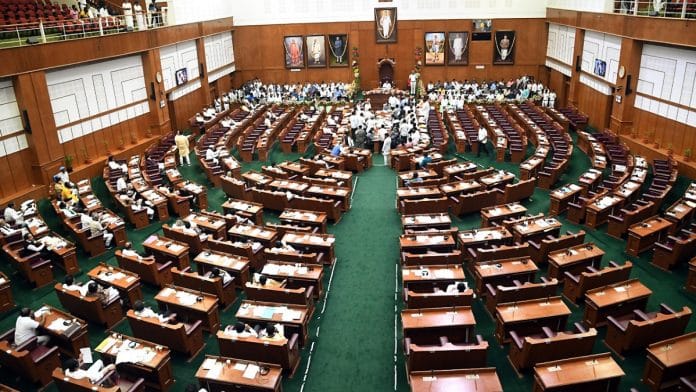Thank you dear subscribers, we are overwhelmed with your response.
Your Turn is a unique section from ThePrint featuring points of view from its subscribers. If you are a subscriber, have a point of view, please send it to us. If not, do subscribe here: https://englishdev.theprint.in/subscribe/
How foreboding are these words from the ancient text? “The fourfold order was created by me according to the divisions of quality and work. Though I am its creator, know Me to be incapable of action or change”. So, it says in Ch IV para 13 of the Bhagwat Gita, as the Charioteer Lord Krishna while exhorting the reluctant Pandava warrior Arjuna to fight in the war as part of the duty of a Kshatriya. This was a reference to the varna order that existed in the Indian society based on occupation – The Brahmins (the priests), Kshatriyas (warriors and nobility), Vysya (farmers, traders and artisans) and Shudras (the service providers). The division is on quality (aptitude) and work (karma). Some people were born outside of (and below) the varna order; they were called “untouchables” or Dalits.
The irony is that during the period of the epic, Hinduism was not a religion and there were no Hindus and later around 400 BCE, Jainism, Buddhism, et al started out as variations of the Hindu philosophy in approach and content. During the British rule there was an attempt to empower the “outcastes” by some princely states and the Raj. Post 1947, Independent India instituted laws to protect the “Scheduled castes” and tribes, which included both the untouchables and groups living the traditional lifestyles making provisions in its constitution. These laws include quota systems in education and government jobs.
Despite the existence and attempts to empower the erstwhile under privileged because of this caste system in Indian society, there is no consensus on its distribution among the people to be empowered. Census data, is old and suspect. Recent surveys throw up diverse results. The political compulsions, for vote shares, then dictated the approach to define reservations. Consequently, categories eligible for quota increased taking eligibility to more than the allowed 50% in many states, though some are under litigation. A section of the government feels that any attempts at caste-based census will now be a retrograde step.
The native population of Indians, at the time of default definition of varnas, more than 3000 years ago, belonged to no particular religion. Only with the advent of the Abrahamic religions into India, the original inhabitants of the subcontinent, who were not people of the book, came to be referred as Hindus. In such a scenario, it is natural that many locals converted to Abrahamic religions. In the process the majority of the converts were those from the “lower” strata of the society who were also economically deficient. Two points stand out: 1) The erstwhile caste system has unobtrusively physically penetrated across all religions 2) Most of those included in the erstwhile underprivileged strata of society, are also economically deprived.
Unfortunately, the very presence of a quota system based on caste can perpetuate caste, because it incentivizes identifying with caste groups in order to reap the benefits of some reservation or the other at the expense of merit and individualism, denting quality of development. Rreservation should not be an end but a means – a means to secure social justice leading to better status in society and economic well being. Reservation should not be allowed to become a vested interest to be exploited for political ends. As a consequence, over a period, a person’s caste has become more of a political game for vote banks rather than for social or economic progress of this class. The aim should be to eliminate the causes that have led to the social, educational, and economic backwardness of the weaker sections of the society. It remains to be seen if Indian society will avoid becoming one of vested interests, given the stake artificially created in many groups in the reservation system.
The biggest advantages of the reservation system in government jobs and colleges is it ensures work of respectable stature. Monetary benefit by way of concessions in in application fees and other fees is another. The wages and concessions also reduce the income gap and provide social justice to the most marginalized and underprivileged as a right. The disadvantages, are compromise in quality of output and favoring the rich backward class. The selection system ignores merit and wealth. As it helps many backward classes irrespective of their wealth it also ignores forward class persons who are financially weak or uninfluential.
Tailpiece: Reservations based on caste and not based on economic conditions are unethical, unacceptable and counterproductive. Reservations should be addressed in two ways. One system should solely aim at uplifting the status of the lower strata in society eliminating discrimination in public places, work space and other social interactions. The second system, providing limited quota, should be based on factors such as gender, family (education, employment, property, income) and if any disabilities. Such an approach will serve equally well the underprivileged of all religions and castes.
These pieces are being published as they have been received – they have not been edited/fact-checked by ThePrint.


